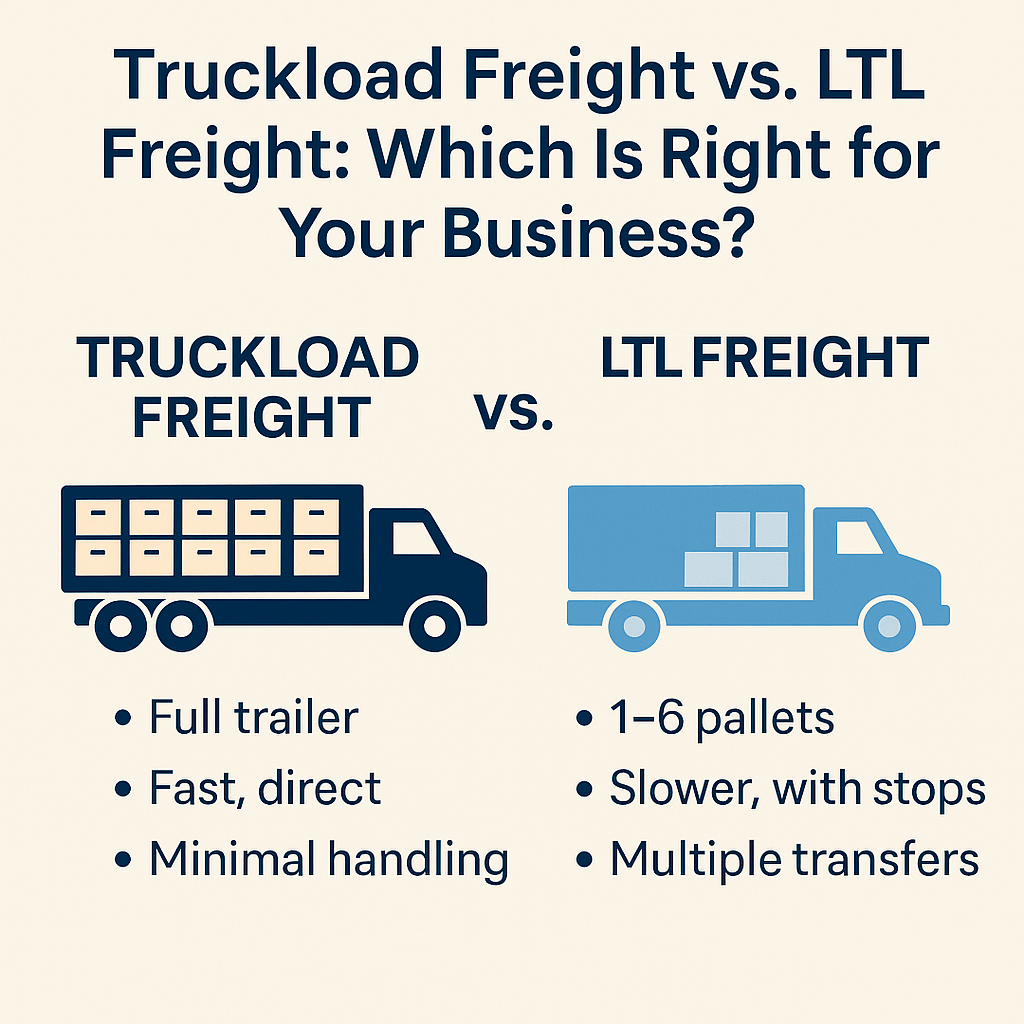When it comes to shipping freight, the choice often comes down to truckload freight (FTL shipping) or less-than-truckload freight (LTL shipping). Both are reliable options, but each serves different business needs. Picking the wrong one can cost you time, money, and customer trust.
This guide breaks down the differences between truckload vs. LTL freight, so you’ll know exactly which one fits your business.
What Is Truckload Freight (FTL)?
Truckload freight, also called full truckload (FTL) shipping, is when a single customer books the entire trailer for their freight. Even if your freight doesn’t fill the entire truck, you pay for exclusive use of that equipment.
Best for:
-
Shipments of 20–24 pallets or more
-
Urgent deliveries that need to go direct
-
Freight that’s fragile, high-value, or sensitive
-
Businesses that want control over pickup and delivery schedules
Pros of Truckload Freight:
-
Faster transit times (direct point-to-point delivery)
-
Less handling, reducing the risk of damage
-
More efficient on a cost-per-pound basis for high-volume shipments
Cons:
-
Higher total cost if you don’t have enough freight to fill the trailer
-
May not be practical for smaller shipments
What Is LTL Freight?
LTL freight shipping (less-than-truckload) is designed for smaller shipments that don’t require a full trailer. Your freight shares space with shipments from other businesses, and you only pay for the space you use.
Best for:
-
Shipments between 1 and 6 pallets
-
Businesses shipping smaller volumes on a regular basis
-
Cost-conscious shippers with flexible delivery times
Pros of LTL Freight:
-
Lower cost for small loads
-
Ideal for recurring, smaller orders
-
Great for businesses that don’t need to ship a full truck
Cons:
-
Longer transit times since freight is routed through hubs
-
Multiple touchpoints increase the chance of damage
-
Less control over scheduling compared to full truckload
Truckload vs. LTL Freight: Key Considerations
When comparing FTL vs. LTL shipping, think about:
-
Shipment Size – Large shipments often make truckload the better option. Smaller shipments fit well with LTL.
-
Transit Speed – Truckload offers faster, direct delivery. LTL is slower due to multiple stops.
-
Budget – LTL is more affordable for small shipments, while truckload is cost-effective for bigger ones.
-
Freight Sensitivity – Fragile or high-value items benefit from the minimal handling of truckload.
-
Shipping Frequency – Businesses shipping often may use both, depending on order size.
Truckload vs. LTL: Side-by-Side Comparison
| Factor | Truckload (FTL) | LTL Freight |
|---|---|---|
| Shipment Size | Full trailer (20–24+ pallets) | 1–6 pallets |
| Speed | Fast, direct transit | Slower, with stops |
| Handling | Minimal touchpoints | Multiple transfers |
| Cost | Higher total cost, lower per-unit | Lower cost overall for small loads |
| Best For | Large, urgent, or fragile shipments | Small, flexible, cost-conscious shipments |
Which Freight Option Is Right for You?
-
Choose truckload freight (FTL shipping) if you have large, urgent, or sensitive shipments that require speed and minimal handling.
-
Choose LTL freight shipping if you’re moving smaller shipments, are budget-focused, and don’t mind longer transit times.
Many companies benefit from using both, depending on the size and urgency of each shipment. The key is knowing when each option makes the most sense.
Final Takeaway
When it comes to truckload freight vs. LTL freight, think of it like this:
-
FTL shipping is the express lane—dedicated, fast, and ideal for big moves.
-
LTL shipping is the shared lane—affordable, efficient, and perfect for smaller loads.
The smartest businesses work with a logistics partner who can guide them on a shipment-by-shipment basis, ensuring they get the right balance of speed, cost, and reliability.
👉 At Firehouse Freight LLC, we help businesses navigate the truckload vs. LTL decision every day. If you’re unsure which option fits your next shipment, reach out—we’ll make sure your freight moves the right way.

